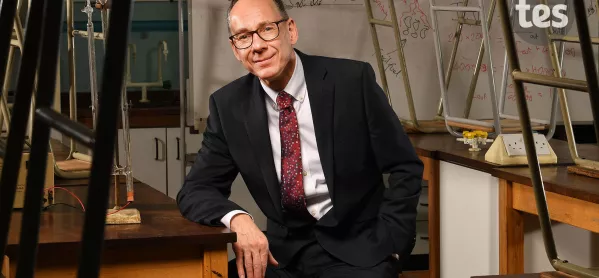It is a “lie” to say that exams are the “best and fairest” way to judge students’ abilities, the president of the country’s biggest teaching union said today.
And the preference for the assessment method, which has been “repeated over and over again” by education secretary Gavin Williamson, should be “challenged”, according to Robin Bevan, president of the NEU teaching union.
Speaking at the annual NEU conference, Mr Bevan compared Mr Williamson to the fictional character Pinocchio, whom he described as a “rather dismal, persistent-lying, wooden-headed puppet”.
NEU: Teachers back GCSE reform ‘to restore a love of learning’
Exams: We’re ‘absolutely’ keeping GCSEs, says Gavin Williamson
Interview: 10 questions with Robin Bevan
“Throughout recent months, we have seen that the secretary of state is, indeed, wooden-headed, is, indeed, a puppet, is limp and spineless,” he said.
GCSEs: Exams ‘are not the best way for students to show what they can do’
Turning to exams, he added: “Pinocchio, of course, also has that characteristic of the nose that grows with every lie that is told. And there is one lie that really must be challenged, repeated over and over again by our secretary of state. The lie that exams are the best and fairest way for young people to show what they know and can do.
“And here, I’m not talking about his incessant and unrelenting desire to see exams take place this year. I’m talking generally. It takes a particular level of ignorance to make that statement.
“Because, and here we get just a little bit technical, all of us, as educationalists know, that the format of a valid assessment derives from the domain being assessed.”
Mr Bevan said his issue was with “not just the format” of exams, but the “issues of reliability”.
“High-quality assessment doesn’t depend on performance on the day, doesn’t depend on the marker you’re assigned to, doesn’t depend on the selection of questions that just happen to appear on the paper,” he said.
“High-quality assessment would have the same outcome with the same competence of the individual being assessed.
“It’s time to rethink assessment. It’s time to put that lie in the bin. Exams are not the best, exclusive, fairest way for young people to show what they know and can do.”
He also warned that “huge elements of curriculum design” have been “sacrificed” on the “altar of exams-only assessment”.
“It’s an absurd idolatry that has reduced rich domains of learning to tests of rapid recall,” he said. “Rich fields of understanding to surface level probing, and rich dimensions of skill to a narrow focus on individual performativity.”
A Department for Education spokesperson said: “Throughout the pandemic, the education secretary has put the safety of staff and pupils at the core of all decision making and has ensured schools and colleges have been fully open wherever possible, based on the best available scientific and medical advice.
“The course of the pandemic has led to swift decisions being taken to respond to changes in our understanding of the virus and action has had to be taken in the national interest.
“The full return of all pupils in March has been thanks to the hard work of staff and young people who have consistently followed the range of protective measures put in place to reduce the risk of transmission.
“We have made clear that exams are the fairest way to assess pupils, and our reformed GCSEs rigorously assess their knowledge while preparing young people leaving school or college for the workplace or higher study.”





